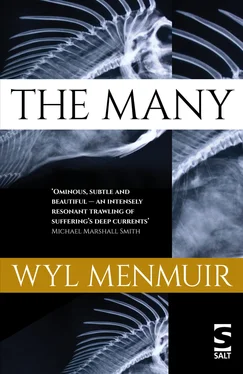Wyl Menmuir - The Many
Здесь есть возможность читать онлайн «Wyl Menmuir - The Many» весь текст электронной книги совершенно бесплатно (целиком полную версию без сокращений). В некоторых случаях можно слушать аудио, скачать через торрент в формате fb2 и присутствует краткое содержание. Год выпуска: 2016, Издательство: Salt, Жанр: Современная проза, на английском языке. Описание произведения, (предисловие) а так же отзывы посетителей доступны на портале библиотеки ЛибКат.
- Название:The Many
- Автор:
- Издательство:Salt
- Жанр:
- Год:2016
- ISBN:нет данных
- Рейтинг книги:4 / 5. Голосов: 1
-
Избранное:Добавить в избранное
- Отзывы:
-
Ваша оценка:
- 80
- 1
- 2
- 3
- 4
- 5
The Many: краткое содержание, описание и аннотация
Предлагаем к чтению аннотацию, описание, краткое содержание или предисловие (зависит от того, что написал сам автор книги «The Many»). Если вы не нашли необходимую информацию о книге — напишите в комментариях, мы постараемся отыскать её.
The Many — читать онлайн бесплатно полную книгу (весь текст) целиком
Ниже представлен текст книги, разбитый по страницам. Система сохранения места последней прочитанной страницы, позволяет с удобством читать онлайн бесплатно книгу «The Many», без необходимости каждый раз заново искать на чём Вы остановились. Поставьте закладку, и сможете в любой момент перейти на страницу, на которой закончили чтение.
Интервал:
Закладка:
‘It’s a boy.’
The midwife’s accent is soft, Spanish or Latin American, and Timothy has the urge to tell her he has always wanted to visit Colombia or Bolivia. He smiles, though it is a smile he has not known before: a boy. The midwife offers him the scissors and stretches the cord a little for him to cut. He is a father again and he smiles and asks to hold his son.
Outside the window is a courtyard, though it is empty of patients, a small area for smokers with a bench beneath a bare tree.
When the midwife returns with Perran, they have dressed him in blue, with a hat pulled down over his head and secured with a blue ribbon tied beneath his chin, blue to match the dark blue of his lips. It is not what he would have chosen for his son, too fussy.
Later, while Lauren sleeps, he picks Perran out of the crib they have arranged for him and holds him to his chest. He tells him stories about his mother and then he sleeps a little in the chair in the corner of the room and when he wakes, he watches his wife and son through long hours.
There are more forms, a birth certificate, a death certificate, an apologetic doctor with a stack of papers that need to be read and processed, signed and dated, but mostly long periods of waiting. He sees the word autopsy and knows they are going to ask them to hand over their son though not yet — when you are ready. He signs and dates, signs and dates and then the doctor is gone for a while.
Lauren asks can their son stay with them overnight and the nurse looks pained and she says no, that is not possible, but they will bring him back up to the room in the morning.
Lauren lies back on the thin hospital bed and Timothy tries to make himself comfortable on the armchair in the corner of the room. The chair has a small brass plaque attached to it that says it was donated by a patient some years ago. It is a model that reclines, though the mechanism is broken and throughout the night the chair tries to return itself to its upright position and he gives up trying to sleep on it.
In the morning, they ask for their son back after a night of sleep and no sleep, a night listening to the muffled sounds from the ward outside and the tapping of a bare branch against the window. They wait for what seems an age and when the nurses bring Perran in Timothy takes him from the plastic crib and touches his son’s forehead. It is ice cold, as are the tiny feet he can feel against his arm. He holds his son to his chest for a while, though whether this is to take away some of the cold or to pass over his own warmth he does not know.
Later still, a midwife returns and tells them they can have all the time they need, though when she leaves, she stays in the corridor outside the room, which means there is less time. He feels something stretch as he hands Perran over and it is all he can do not to take him back. The best he can do is to ask them to treat him with compassion. The midwife promises — they always do, she says — and he watches her retreat along the corridor until she turns off the ward with their son.
Timothy taps the fuel gauge. The needle rests on a pin below the empty line and does not respond to his tapping, and he wonders how far the car will get him. He shuts off the engine and returns to the house.
The funeral director’s parlour is little more than a shack in the heart of a sprawling housing estate. Timothy and Lauren drive past it twice and have to stop for directions, though no one seems to have heard of it. They find it eventually, wedged between a used car lot and a general store that has crates piled up outside it, crates overflowing with vegetables, boxes of cleaning utensils, cloths, tins, and children’s watering cans in the shape of elephants. The building itself is a prefabricated hut that looks as though it may once have been a car dealership; they can see, beneath the newer lettering, the evidence of its past life. The hut is raised up on breezeblocks and enclosed within a small compound with a high metal gate and fences topped with barbed wire. After they have parked the car they walk up the metal steps into a small waiting area, where a receptionist tells them Bob will be with them soon. They sit on moulded plastic chairs that look as though they have been requisitioned from a school and try not to listen in to the conversation they can hear going on behind the inner door. The receptionist smiles at them over the counter.
Five minutes later, the door opens and a couple walks out. Lauren and Timothy have to stand to allow them to manoeuvre around them to leave. Through the open door, the funeral director ushers them into his office. He is overweight, and sits behind a desk around which it looks as though he has trouble navigating. On their way through, the floor sways slightly beneath their feet and Timothy notices they have passed across a divide where two parts of the hut have been bolted together. While the funeral director talks to them, Timothy finds he cannot take his attention away from a stain on the man’s white shirt, the remains of a lunch he ate at the desk perhaps. The strip lighting above them buzzes loudly and when they are ushered out, Timothy is aware of arrangements having been made, but he cannot bring any of the details to mind. He asks the girl sitting behind the desk in the cramped reception area if she will send him a copy of what they have agreed and she nods and smiles as though it’s a common request. Outside, the remainder of the day’s light has faded, and when they get beyond the boundary of the small compound, someone closes the heavy metal gate behind them. The yellow light flooding onto the pavement from the shop next door mingles with the music the shopkeeper in the general store has put on since they arrived.
22. Ethan
ETHAN TRIES TO ignore the lines. At first, he rubs at his eyes and hopes, when the water clears from them, that the cracks will be gone. But they remain. The lines run in all directions where they emerge from the sea. At first it seems to Ethan as though they do not intersect — that they run parallel to each other, but gradually they grow in number and he sees the lines start to splinter soon after the point at which they leave the water and cross each other, over and again as if they are multiplying before him. The lines run up through the stones on the beach and into the village, hairline fractures that run and spread throughout the fabric of the whole place. He is not sure why, but he feels sure that, thin as they are, these cracks are signs of fissures too deep to contemplate. Down by the water’s edge they now resemble a tangle of incredibly fine gill nets laid one on top of the other. Ethan retreats up off the beach and across into the village and for a while finds peace, though it is not long before he sees the first cracks appearing in the walls and ceiling of the pub.
He can feel the village starting to break up. He knows for sure, too, that the cracks run through the decks and the holds of the container ships on the horizon and that thought gives him some comfort. He tries to talk with the others about it, wants to point them out to Rab or Jory, but he finds, when he tries, the words will not form in his mouth and he must keep them to himself, since no one else talks of them either.
The lines proliferate. Dark and thin scars on the sand, the concrete, running through windows and doors. Over the course of the day they spread from the land onto the villagers themselves, across the bodies and faces of everyone around him. In a fit of panic, Ethan pulls at his sleeves and sees the white scars on his forearms have spread too, and now run the length of his arms and he knows without looking they now spread across his skin. He can feel them spread inside him too, through his muscles and bones and all his tissues until his body is alive with lines. They spread through what dreams he has when he manages to sleep and after a while they are all he sees, criss-cross scars running through the fabric of everything, running through all the seen and the unseen.
Читать дальшеИнтервал:
Закладка:
Похожие книги на «The Many»
Представляем Вашему вниманию похожие книги на «The Many» списком для выбора. Мы отобрали схожую по названию и смыслу литературу в надежде предоставить читателям больше вариантов отыскать новые, интересные, ещё непрочитанные произведения.
Обсуждение, отзывы о книге «The Many» и просто собственные мнения читателей. Оставьте ваши комментарии, напишите, что Вы думаете о произведении, его смысле или главных героях. Укажите что конкретно понравилось, а что нет, и почему Вы так считаете.











